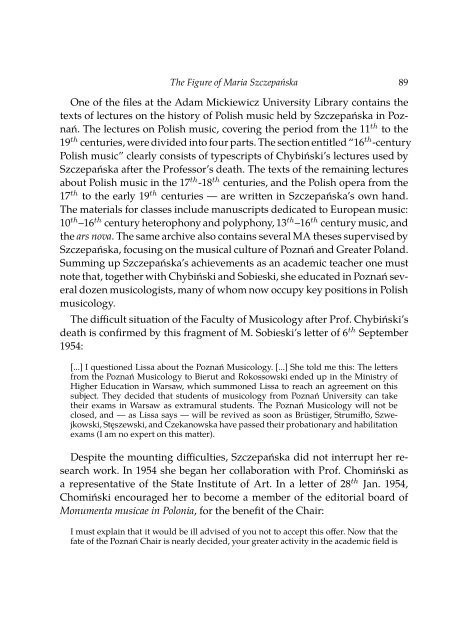Musicology Today 2012 100 Years of Polish Musicology
Musicology Today 2012 100 Years of Polish Musicology
Musicology Today 2012 100 Years of Polish Musicology
Create successful ePaper yourself
Turn your PDF publications into a flip-book with our unique Google optimized e-Paper software.
The Figure <strong>of</strong> Maria Szczepańska 89<br />
One <strong>of</strong> the files at the Adam Mickiewicz University Library contains the<br />
texts <strong>of</strong> lectures on the history <strong>of</strong> <strong>Polish</strong> music held by Szczepańska in Poznań.<br />
The lectures on <strong>Polish</strong> music, covering the period from the 11 th to the<br />
19 th centuries, were divided into four parts. The section entitled “16 th -century<br />
<strong>Polish</strong> music” clearly consists <strong>of</strong> typescripts <strong>of</strong> Chybiński’s lectures used by<br />
Szczepańska after the Pr<strong>of</strong>essor’s death. The texts <strong>of</strong> the remaining lectures<br />
about <strong>Polish</strong> music in the 17 th -18 th centuries, and the <strong>Polish</strong> opera from the<br />
17 th to the early 19 th centuries — are written in Szczepańska’s own hand.<br />
The materials for classes include manuscripts dedicated to European music:<br />
10 th –16 th century heterophony and polyphony, 13 th –16 th century music, and<br />
the ars nova. The same archive also contains several MA theses supervised by<br />
Szczepańska, focusing on the musical culture <strong>of</strong> Poznań and Greater Poland.<br />
Summing up Szczepańska’s achievements as an academic teacher one must<br />
note that, together with Chybiński and Sobieski, she educated in Poznań several<br />
dozen musicologists, many <strong>of</strong> whom now occupy key positions in <strong>Polish</strong><br />
musicology.<br />
The difficult situation <strong>of</strong> the Faculty <strong>of</strong> <strong>Musicology</strong> after Pr<strong>of</strong>. Chybiński’s<br />
death is confirmed by this fragment <strong>of</strong> M. Sobieski’s letter <strong>of</strong> 6 th September<br />
1954:<br />
[...] I questioned Lissa about the Poznań <strong>Musicology</strong>. [...] She told me this: The letters<br />
from the Poznań <strong>Musicology</strong> to Bierut and Rokossowski ended up in the Ministry <strong>of</strong><br />
Higher Education in Warsaw, which summoned Lissa to reach an agreement on this<br />
subject. They decided that students <strong>of</strong> musicology from Poznań University can take<br />
their exams in Warsaw as extramural students. The Poznań <strong>Musicology</strong> will not be<br />
closed, and — as Lissa says — will be revived as soon as Brüstiger, Strumiłło, Szwejkowski,<br />
Stęszewski, and Czekanowska have passed their probationary and habilitation<br />
exams (I am no expert on this matter).<br />
Despite the mounting difficulties, Szczepańska did not interrupt her research<br />
work. In 1954 she began her collaboration with Pr<strong>of</strong>. Chomiński as<br />
a representative <strong>of</strong> the State Institute <strong>of</strong> Art. In a letter <strong>of</strong> 28 th Jan. 1954,<br />
Chomiński encouraged her to become a member <strong>of</strong> the editorial board <strong>of</strong><br />
Monumenta musicae in Polonia, for the benefit <strong>of</strong> the Chair:<br />
I must explain that it would be ill advised <strong>of</strong> you not to accept this <strong>of</strong>fer. Now that the<br />
fate <strong>of</strong> the Poznań Chair is nearly decided, your greater activity in the academic field is
















